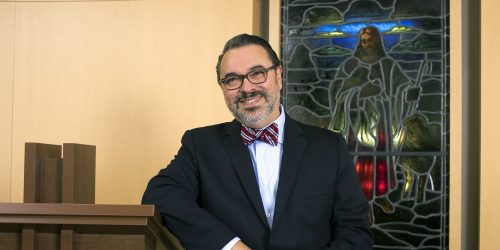
Q: You joined AMITA Health in June as senior vice president and chief Adventist mission officer. What is your background?
A: I most recently was executive director of Behavioral Health and Wellness at Adventist HealthCare’s Washington Adventist Hospital in Takoma Park, Md. I had previous positions at Adventist HealthCare hospitals in Maryland, and also was a pastor of Sligo Church in Takoma Park.
Q: What attracted you to AMITA Health?
A: The main attraction was having the Adventists and the Catholics coming together to keep their mission going. It was exciting to see how we could integrate our mission of “extending the healing ministry of Jesus” in our markets and communities. I thought, “This is something new, and I want to be part of it.”
I am working with Mary Paul, interim chief Catholic mission integration officer. The Catholic and Adventist traditions have some differences, but we have much more in common. For all of us, extending the healing ministry of Jesus means to have that compassion, to have that sense of justice.
Q: Central to mission integration are the mission trips. What are you working on now in terms of both local and international trips?
A: In our first Mission at Home in June in Harvey [Ill.], we served 207 patients in one day, which was amazing. We plan to have two domestic missions a year, starting next April 27 in Harvey. These missions re-energize the people who participate. It’s a hard day working, but it reconnects us to why we came to healthcare to begin with.
I and about 30 others are going to El Salvador in November for our next Global Medical Mission. After this trip, we will take a short break to restructure our international missions a little, especially to involve some of our administrators to visit with administrators overseas. We want to form a kind of partnership of the heart, almost like sister cities. That will help create a continuum of care.
Q: What are some of the other new initiatives on which you are working?
A: We are very aware that any interaction anywhere within our system has a spiritual component. We are treating the whole person — mind, body and spirit — for associates and patients alike. We have several ongoing programs in this area.
For example, we have begun a program called Clinical Mission Integration, which provides spiritual support for our associates in the outpatient setting. We also are training interested people throughout within the system to be spiritual ambassadors. They act as a type of first responders for those who need spiritual care, supporting them, praying with them, or just listening.
We have a program called No One Dies Alone, or NODA, to teach volunteers how to be with a dying person. At a recent meeting in Bolingbrook, more than 200 people from the community came out to volunteer for NODA, when we expected only 30 to 40. And we just started a program in cooperation with local academies that is designed to promote healthy lifestyles among young people.
We try to find ways to meet the needs of people both inside and outside AMITA Health. We are very careful to make sure that the integration of our mission has more than an internal focus, because we are serving entire communities.
---
Julie Busch, associate vice president, Internal Communications, AMITA Health
Photo by Jim Svehla